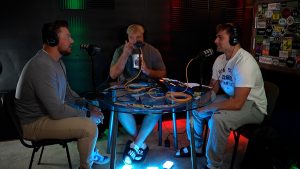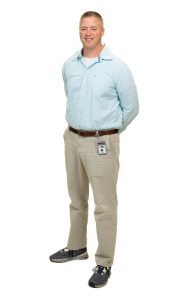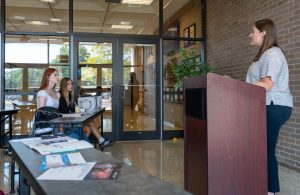Beyond North Allegheny
There can be nothing more valuable to students’ education than to meet with professionals in their fields of interest
March 6, 2019
“I love what I do.”
During our January trip to Washington DC, staff members of The Uproar met with a variety of reporters and other professionals working in journalism and related fields. Talking with these people, we got a really good sense of what their jobs are like — what struggles they have, what career paths they took, things they like and dislike about their jobs, and the amazing experiences they have been through.
The first person we met was a CNN reporter who exclusively reports on the Mueller Investigation. We also met with two filmmakers who had started their own studio and produce documentaries for nonprofits. Later on, we met up with writers from The Washington Post and photo editors from National Geographic. It seemed that everyone we met encouraged us to pursue a career that revolves around something you have a passion for.
Yet, walking out of each meeting, I had very polar reactions. I no longer felt that journalism was right for me, but I was now beginning to consider a career in filmmaking. These events forced me to focus on my future. Like many high school students, I have vague ideas of what I want my professional life to be. Speaking with these professionals who had their career paths together made me think of the years ahead.
Most people at least have a bare-bones idea of what they want to contribute to the world. Some are inspired by a celebrity in the field or a particularly good teacher; others may follow in their parents’ footsteps.
However, these interactions showed me the distinct differences in what the world sees and what actually occurs in the day-to-day life of most careers. These stark disparities made me realize the importance of schools to offer meetings with professionals in careers students are interested in, such as the ones we had with journalists and filmmakers in Washington.
In all fairness, North Allegheny already offers numerous opportunities like this through GOAL, such as seminars that explore a wide variety of professions from law to music. These seminars are often held by professors and college students, and while this still helps students gauge what the course load will be like in college and how to prepare for higher education, such meetings might lack in providing a sense on what a career in the specific major would truly entail.
Establishing a career day where students are given the opportunity to walk around and meet people from industries they are potentially interested in could be a real help for high school students getting ready to commit to college. Knowing the meticulous details of what actually occurs in a job might change what field a student wants to enter and help them avoid the hassle of switching majors in college or switching career paths after they’ve graduated.
Planning out the next forty years of a professional life is impossible for almost everyone. Yet that doesn’t mean logic and reason should be thrown to the wind. Big mistakes early on in one’s career can be easily avoided if one puts effort into learning what a job actually is. Factors such as hours and job security are often overshadowed by the glory of fame or fortune. A perfect example would be a Hollywood career like acting. Looking at Dwayne Johnson or Emma Watson — you might think you can just show up, get a lead role, and buy a mansion and a Ferrari, but that overlooks the hundreds of thousands of actors barely making ends meet in one-bedroom apartments who are lucky if they get a background role in a rash ointment commercial.
While this is an extreme example, it highlights how important it is to meet everyday people in the industry you intend to make yourself part of. With a little determination, NA can provide such valuable opportunities to all of its students.












